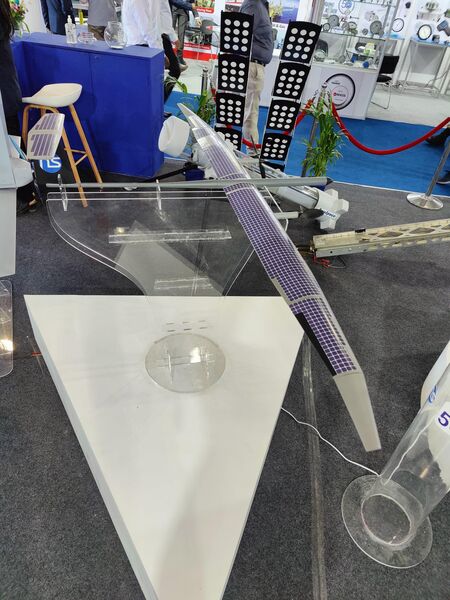
A model of the solar-powered High-Altitude Pseudo-Satellite (HAPS) being developed in India, at Defexpo 2022 in Gandhinagar, Gujarat, on 19 October. (Janes/Akhil Kadidal)
A scale model of a High-Altitude Pseudo-Satellite (HAPS) being developed in India has conducted two test flights. Developers said preparations are under way to build a full-scale model for additional flight testing.
Speaking to Janes at DefExpo 2022, held at Gandhinagar, Gujarat, from 18 to 22 October, a spokesperson of the startup, NewSpace Research and Technologies Pvt Ltd, said that the scale model of the HAPS had conducted a preliminary test flight on 8 September.
The HAPS is being designed as an autonomous, solar-powered unmanned aerial system (UAS). According to the company, the aircraft is being designed to stay airborne for more than 90 days while cruising at an altitude of 65,000 ft.
“The scale model, which was tested has a wingspan of 8 m. The full-sized HAPs is planned to have a wingspan of 24 or 25 m,” the company spokesperson said. “A second test was conducted two weeks later.”
The UAS is being developed by NewSpace in collaboration with Hindustan Aeronautics Limited (HAL). HAL is the prototype development partner.
Video images of the testing showed the UAS being launched from a speeding multi-utility vehicle on the runway at HAL's testing and factory airbase in Bangalore, Karnataka.
According to NewSpace, the scaled-down prototype did not have the solar panels that will be mounted in the full-sized prototype. “The initial flight lasted for five minutes,” the company spokesperson said.
Looking to read the full article?
Gain unlimited access to Janes news and more...







